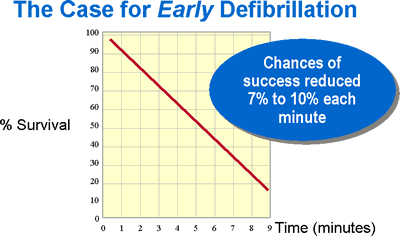Defibrillation is the delivery of a specific electrical shock to the heart. This shock stops the uncoordinated electrical activity of the heart, and allows the return of the heart's regular rhythm and pulse. Defibrillation is the only definitive treatment for sudden cardiac arrest, and time is very critical.
Surviving SCA is largely dependent on how quickly the patient is defibrillated. For each minute that defibrillation is delayed, the victim's chance of survival decreases by seven to ten percent. The patient suffers irreversible brain damage within 4 to 6 minutes after cardiac arrest. After 10 minutes, few victims of SCA survive. The American Heart Association estimates that an additional 40,000 lives could be saved each year with widespread access to defibrillators.
